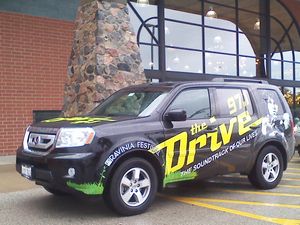















Honda Pilot |
|---|
|
| Topic Navigation |
|---|
|
Wikipedia: Honda Pilot
Page Sections History Photographs Documents Article Index |
History
The following section is an excerpt from Wikipedia's Honda Pilot page on 15 July 2017, text available via the Creative Commons Attribution-ShareAlike 3.0 Unported License.
The Honda Pilot is a mid-size crossover SUV manufactured by Honda and introduced in 2002.
Primarily aimed at the North American market, the Pilot is the largest SUV from Honda and features three-row seating. Pilots are currently manufactured in Lincoln, Alabama, and the Pilot was produced in Alliston, Ontario until April 2007. The first generation Pilot was released in April 2002 as a 2003 model.
The Pilot shares its platform with the Acura MDX, as well as the Odyssey minivan and the Accord sedan. The Pilot’s unibody construction and independent suspension is designed to provide handling similar to that of a car and has integrated perimeter frame rails to allow towing and light off-road use.
Prior to the introduction of the Pilot, Honda marketed the compact crossover CR-V, and the Honda Passport, (a rebadged Isuzu Rodeo) that was a pickup truck-based design. The Pilot is Honda's largest and only three-row SUV, although the 2010 Crosstour surpassed the Pilot in length.
The Pilot is sold in North America, while the Honda MDX (first generation Acura MDX) was marketed in Japan and Australia for several years. The Pilot is badged Honda MR-V in the Middle East. The second generation Pilot is also marketed in Russia, Ukraine, and in the Dominican Republic. The Pilot is also sold in the Philippines.
First generation (2003–2008)
Specifications
The 2003-2004 Pilots featured the J35A4 motor, an aluminum-alloy 3.5L V6 producing 240 HP and 242 lb-ft of torque. The 2005 Pilot received a new engine, the J35A6, which featured drive-by-wire throttle and produced 255 HP and 250 lb-ft of torque. Refreshed 2006-2008 Pilots came with either the J35Z1 (FWD) or the J35A9 (4WD). Both engines are rated at 244 HP and 240 lb-ft of torque. Refreshed FWD models feature Honda's Variable Cylinder Management system, which can deactivate up to three cylinders under light load to increase fuel economy. All Pilots from this generation feature a 5-speed automatic transmission. The Pilot has front struts with a coil-spring, multilink rear suspension for a flat rear load floor. Front track is 66.3 in (1,684 mm) and 66.5 in (1,689 mm) at the rear. The Pilot has a 4,500 lb (2,041 kg) boat/3,500 lb (1,588 kg) trailer towing capability with the optional dealer installed towing package.
2003-2005 Pilots came with Honda's Variable Torque Management 4WD system (VTM-4). Under normal driving conditions, most power is transferred to the front wheels while some is sent to the back wheels. If wheel slippage is detected up front, up to 50% of power can be sent to the rear wheels. The system features a VTM-4 lock button on the dashboard which locks the rear differential and sends 25% of the power to each rear wheel. However, the VTM-4 lock function only operates in first, second, and reverse, and automatically disengages above 18mph, then re-engages when the speed drops below 18mph. 2006 refresh models were the first time a Pilot has been offered in FWD.
Design
Design of the Pilot was by Honda's Ricky Hsu through 1999, when styling was approved. The Pilot can accommodate up to eight passengers in three rows configured as stadium seating. The third row can seat three, but the limited legroom makes it suitable only for small children or adults on short trips. Similar to the Honda Odyssey, the rear seats can be folded into flat surfaces for larger cargo. Options include powered moonroof, DVD entertainment system, and a navigation system.
Other features include ABS-equipped four-wheel disc brakes, rack-and-pinion steering, four-wheel independent suspension, and 282° of outward visibility.
2006 Facelift
Honda revised the Pilot for the 2006 model year in October 2005. Changes to the exterior included a new fascia with a different grille insert and halogen projector headlights, and taillights with clear lenses. The EX trim level received redesigned wheels, and the original EX wheels were now found on the LX trim. On the inside, side airbags were provided in the C pillar, the gauge cluster was updated and the center console featured chrome trim and redesigned storage compartments and cup holders.
Second generation (2009–2015)
The larger second generation Pilot was unveiled in January 2008 at the North American International Auto Show. Assembled at Honda Manufacturing of Alabama in Lincoln, Alabama, it was offered in four trims; LX, EX, EX-L, and Touring. It received a new 3.5-liter V6 VTEC engine producing 250 hp (186 kW; 253 PS) SAE net at 5700 rpm and 253 lb·ft (343 N·m) of torque at 4800 rpm. EPA fuel economy is rated at 17 mpg city /23 mpg highway with front-wheel-drive and 16 mpg city / 22 mpg highway for all-wheel-drive.
Both drivetrains were equipped with five-speed automatics. The second generation's wheelbase is 109.2 in, with a length of 190.9 in, a width of 78.5 in, a height of 71.0 in and interior space of 153.7 cu-ft. The redesigned headlights lost the previous generation's halogen projectors and return to standard halogen reflectors. Features included new two-position memory settings for the driver's seat, a new power tailgate, and the gear shift was relocated from the steering column to the center console between the front seats. The Touring trim included a 120-volt power outlet and a satellite-linked Honda navigation system.
Third generation (2016–present)
The third-generation 2016 Pilot debuted at the Chicago Auto Show in February 2015, production began during May, and was made available for sale in June.
The exterior is sleeker in appearance compared to its boxier predecessor. Added to the exterior are optional LED headlamps with automatic high-low beam switching, LED daytime running lights (DRLs), and LED brake tail lights and the new Elite model. New features also include heated rear seats, ventilated front seats, and a panoramic roof to Elite models only. Alloy wheels became standard.
Newly available safety features include Honda's LaneWatch passenger side mirror camera or Blind Spot Information (BSI) and rear Cross Traffic Monitor. Additional options include Lane Departure Warning (LDW) with Lane Keeping Assist System (LKAS) and Road Departure Mitigation (RDM), Forward Collision Warning (FCW) with Collision Mitigation Braking System (CMBS), Adaptive Cruise Control (ACC). A tri-angle backup camera is standard with dynamic guidelines optional.
The revised 3.5-liter V6 engine has direct-injection and start-stop system with improved power at 280 hp (209 kW; 284 PS), a 6-speed automatic is standard while a ZF 9-speed automatic is optional. With all-wheel drive models the amount of engine torque sent to each rear wheel is variable. EPA-estimated fuel economy is improved with FWD 6-speed models registering 19/27/22 mpg, and AWD models registering 18/26/21 mpg (city/highway/combined). 9-speed models see fuel economy of 20/27/23 mpg in FWD configuration and 19/26/22 mpg in AWD.
Overall dimensions are larger, while weight is down approximately 300 pounds with noise, vibration, and harshness (NVH) reduced. Structurally 21.3% of the Pilot's body is composed of 980, 1300 and 1,500 MPa ultra-high-strength steels, 5% is from aluminum or magnesium, an additional 34.5% is 270 MPa mild strength steel used in areas to minimize repair costs.
 |
97.1FM The Drive Photo ©2011 Bill Crittenden View photo of 97.1FM The Drive Honda Pilot - 631KB |
 |
97.1FM The Drive Photo ©2011 Bill Crittenden View photo of 97.1FM The Drive Honda Pilot - 750KB |
| Date | Document Name & Details | Documents |
|---|---|---|
| 10 January 2003 | Safety Compliance Testing for FMVSS 135: Passenger Car Brake Systems 2003 Honda Pilot, 5-Door MPV National Highway Traffic Safety Administration | PDF - 3.3MB - 72 pages |
| 2 May 2003 | Safety Compliance Testing for FMVSS 201U: Occupant Protection in Interior Impact, Upper Interior Head Impact Protection 2003 Honda Pilot 4-Door SUV National Highway Traffic Safety Administration | PDF - 5.4MB - 165 pages |
| 4 June 2003 | Safety Compliance Testing for FMVSS No. 301L: Fuel System Ingegrity 2003 Honda Pilot EX MPV National Highway Traffic Safety Administration | PDF - 4.3MB - 62 pages |
| 29 October 2003 | Safety Compliance Testing for FMVSS 225: "Child Restraint Anchorage Systems" 2003 Pilot 5-Door Wagon National Highway Traffic Safety Administration | PDF - 856KB - 71 pages |
| March 2007 | Not-in-Traffic Surveillance Calspan Remote Hyperthermia Investigation Vehicle: 2005 Honda Pilot National Highway Traffic Safety Administration | PDF - 1,402KB - 17 pages |
| 30 January 2008 | NHTSA Recall 08E013000 2003-2008 Acura MDX, 2003-2008 Honda Pilot, 2003-2008 Honda Ridgeline Equipment:Mechanical:Carrier/Rack National Highway Traffic Safety Administration | Recall Page - 1 page |
| 30 January 2008 | From: William R. Willen, American Honda Motor Co., Inc. To: Daniel Smith, National Highway Traffic Safety Administration NHTSA Recall 08E013000 | PDF - 388KB - 6 pages |
| 22 February 2008 | Aftermarket Hitch Style Bike Rack From: George H. Person, National Highway Traffic Safety Administration To: William R. Willen, American Honda Motor Co., Inc. NHTSA Recall 08E013000 | PDF - 29KB - 3 pages |
| 18 March 2008 | From: William R. Willen, American Honda Motor Co., Inc. To: George Person, National Highway Traffic Safety Administration NHTSA Recall 08E013000 | PDF - 93KB - 2 pages |
| January 2009 | Calspan On-Site Certified Advanced 208-Compliant Vehicle Crash Investigation Vehicle: 2008 Honda Pilot National Highway Traffic Safety Administration | PDF - 390KB - 14 pages |
| June 2009 | Calspan On-Site Rollover Crash Investigation Vehicle - 2007 Honda Pilot National Highway Traffic Safety Administration | PDF - 836KB - 27 pages |
| 9 June 2009 | Safety Compliance Testing for FMVSS 201: Occupant Protection in Interior Impact, Upper Interior Head Impact Protection 2009 Honda Pilot 5-Door LX National Highway Traffic Safety Administration | PDF - 4.5MB - 169 pages |
| 22 July 2009 | Safety Compliance Testing for FMVSS 225: "Child Restraint Anchorage Systems" 2009 Honda Pilot National Highway Traffic Safety Administration | PDF - 3.9MB - 131 pages |
| 23 September 2010 | Vehicle Safety Compliance Testing for FMVSS 208, Occupant Crash Protection; FMVSS 212, Windshield Mounting; FMVSS 219, Windshield Intrustion (Partial); FMVSS 301, Fuel System Integrity 2009 Honda Pilot MPV National Highway Traffic Safety Administration | PDF - 38.7MB - 345 pages |
| Date | Article | Author/Source |
|---|---|---|
| 1 September 2009 | 2010 Honda Pilot Test Drive: A Practical Crossover | Mac Demere |
| 8 March 2016 | Petition for Exemption From the Federal Motor Vehicle Theft Prevention Standard; American Honda Motor Co., Inc. | Federal Register: NHTSA (Raymond R. Posten) |
| 31 December 2019 | Updated 2020 Honda Pilot, special edition model arrive at Capital Honda | Capital Honda |
